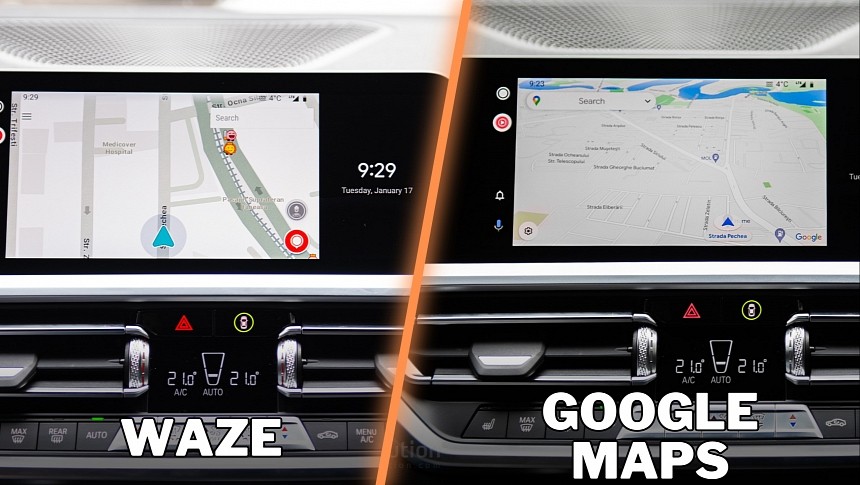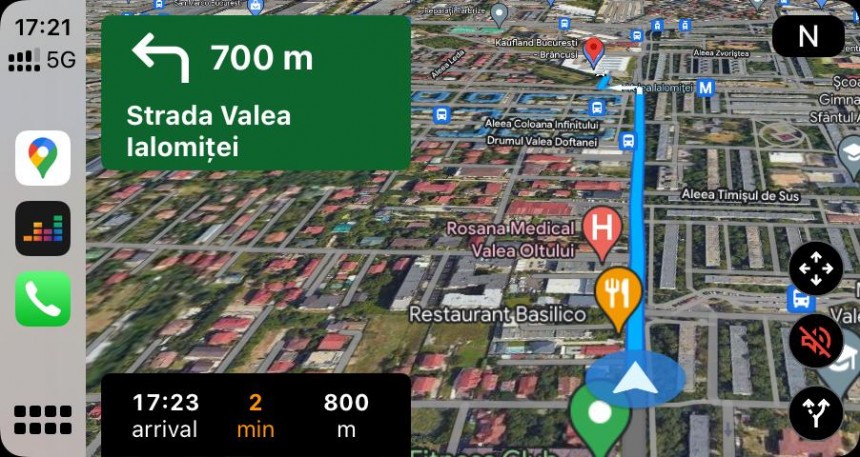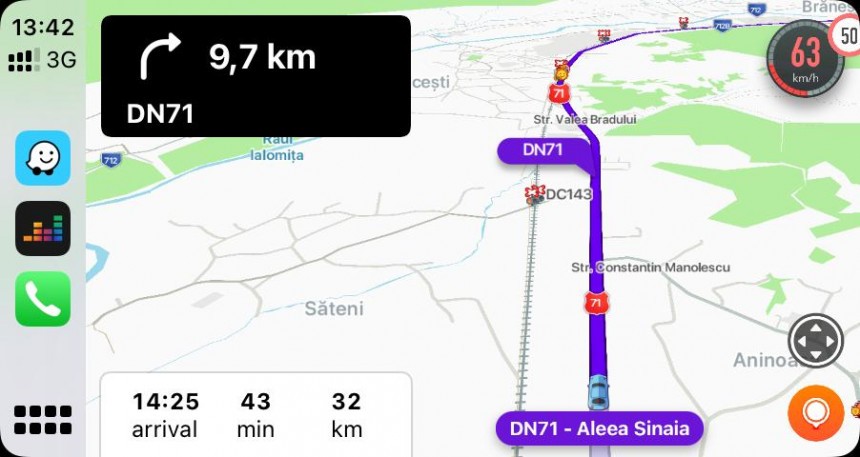Navigation apps have become must-have solutions for the modern driver, especially thanks to the integration of new-generation capabilities.
In cars with Google built-in, Google Maps can monitor the battery range, suggest charging stops, and provide routing accordingly.
Nevertheless, while Google Maps and Waze remain the top choices, their alternatives have also improved significantly. HERE Maps, Sygic GPS Navigation, and TomTom’s sat-nav also sport innovative capabilities, including for electric vehicle drivers.
The competition in this market is therefore becoming fiercer, and it’s not only because Google Maps’ rivals are improving at a fast pace. Google has been focusing mostly on non-navigation features lately, giving its competitors enough time to address the obvious feature gap that pushed many users to Google Maps.
I’m not going to speculate on this too much because rumors suggesting Waze’s end is just around the corner have been around for way too long. However, it’s worth emphasizing that Google Maps and Waze currently have different purposes.
On the one hand, Google Maps is an all-in-one mapping platform. It does offer navigation features, but at the same time, it also sports state-of-the-art world exploration capabilities, street-level imagery, business information, and user reviews.
On the other hand, Waze is, first and foremost, a navigation app. It packs a crowdsourcing engine to be aware of what’s happening on the road and sports an impressively efficient incident reporting system to let users inform each other of traffic conditions.
At some level, this different approach explains why Google Maps and Waze continue to exist as separate apps. But at the same time, it also raises questions about how Google Maps will survive in the long term as a navigation app.
A primary objective of sat-nav solutions is to make the road more predictable. Waze does this with help from its gigantic user base and the incident reporting system. Google tried a similar approach in Google Maps, but its traffic reporting feature is a half-baked implementation, to say the least. Google Maps does borrow some data from Waze, such as accident location, but otherwise, the amount of information it provides for a trip is significantly lower than what its sibling can generate.
This doesn’t mean Waze is a perfect navigation app. It’s not, and the incident reporting system also needs additional capabilities that the Google-owned company has ignored for years. For example, the application should indicate the location of speed bumps, allowing drivers to slow down in advance. School zones aren’t available either.
There are two ways Waze could help Google Maps become the king of navigation solutions, and both come down to the app becoming rather redundant.
First and foremost, Google can import more data from Waze, essentially bringing the information submitted by Waze users to Google Maps. Google Maps users would therefore become aware of traffic conditions and incidents on their routes without a fully featured incident reporting system. However, using Waze would no longer make much sense, in some ways paving the road for more people to make the transition to Google Maps for a more seamless experience. As such, this strategy could backfire, as Google Maps could end up cannibalizing Waze. Google is always hungry for more data (I'm looking at you, Fitbit!), so in many ways, bringing the best of Waze to Google Maps would fit the company's typical approach like a glove.
Second of all, Google can merge Google Maps and Waze. This strategy has allegedly been on the table for quite some time, though the search giant doesn’t seem to pursue the idea. Not yet, at least.
A potential Waze integration in Google Maps would indeed lead to creating an almighty navigation app. But at the same time, it could also make Google Maps more cluttered, especially as Google is investing heavily in non-navigation capabilities.
Whether or not Google Maps and Waze will eventually work together as one is something that remains to be seen, but the search giant has so far remained denied this approach. Waze still makes a lot of sense as a separate app, especially given its different focus from Google Maps, but it’s also not a secret that having two similar solutions isn’t only redundant but also a way to cause confusion in the customer base.
Google is known as a company that doesn’t mind killing off products it’s previously been super-committed to, and Stadia is living proof in this regard. If you ask me, Waze still hangs in the balance.
Nevertheless, while Google Maps and Waze remain the top choices, their alternatives have also improved significantly. HERE Maps, Sygic GPS Navigation, and TomTom’s sat-nav also sport innovative capabilities, including for electric vehicle drivers.
The competition in this market is therefore becoming fiercer, and it’s not only because Google Maps’ rivals are improving at a fast pace. Google has been focusing mostly on non-navigation features lately, giving its competitors enough time to address the obvious feature gap that pushed many users to Google Maps.
Google Maps and Waze
Google currently owns two navigation apps, namely Google Maps and Waze, but the search giant says the latter still works independently from the company. However, Google has recently moved the Google Maps and Waze teams under the same roof in an attempt to streamline the collaboration between the two, making some people believe Waze’s days are already numbered.I’m not going to speculate on this too much because rumors suggesting Waze’s end is just around the corner have been around for way too long. However, it’s worth emphasizing that Google Maps and Waze currently have different purposes.
On the one hand, Google Maps is an all-in-one mapping platform. It does offer navigation features, but at the same time, it also sports state-of-the-art world exploration capabilities, street-level imagery, business information, and user reviews.
On the other hand, Waze is, first and foremost, a navigation app. It packs a crowdsourcing engine to be aware of what’s happening on the road and sports an impressively efficient incident reporting system to let users inform each other of traffic conditions.
At some level, this different approach explains why Google Maps and Waze continue to exist as separate apps. But at the same time, it also raises questions about how Google Maps will survive in the long term as a navigation app.
This doesn’t mean Waze is a perfect navigation app. It’s not, and the incident reporting system also needs additional capabilities that the Google-owned company has ignored for years. For example, the application should indicate the location of speed bumps, allowing drivers to slow down in advance. School zones aren’t available either.
How Waze could help Google Maps
While Waze’s long-term objective is very clear, as its main focus remains the navigation experience, Google Maps is slowly leaving this component behind. This doesn’t mean Google Maps would stop offering route guidance, but in many ways, its navigation features wouldn’t match the tools available elsewhere.There are two ways Waze could help Google Maps become the king of navigation solutions, and both come down to the app becoming rather redundant.
First and foremost, Google can import more data from Waze, essentially bringing the information submitted by Waze users to Google Maps. Google Maps users would therefore become aware of traffic conditions and incidents on their routes without a fully featured incident reporting system. However, using Waze would no longer make much sense, in some ways paving the road for more people to make the transition to Google Maps for a more seamless experience. As such, this strategy could backfire, as Google Maps could end up cannibalizing Waze. Google is always hungry for more data (I'm looking at you, Fitbit!), so in many ways, bringing the best of Waze to Google Maps would fit the company's typical approach like a glove.
A potential Waze integration in Google Maps would indeed lead to creating an almighty navigation app. But at the same time, it could also make Google Maps more cluttered, especially as Google is investing heavily in non-navigation capabilities.
Whether or not Google Maps and Waze will eventually work together as one is something that remains to be seen, but the search giant has so far remained denied this approach. Waze still makes a lot of sense as a separate app, especially given its different focus from Google Maps, but it’s also not a secret that having two similar solutions isn’t only redundant but also a way to cause confusion in the customer base.
Google is known as a company that doesn’t mind killing off products it’s previously been super-committed to, and Stadia is living proof in this regard. If you ask me, Waze still hangs in the balance.























